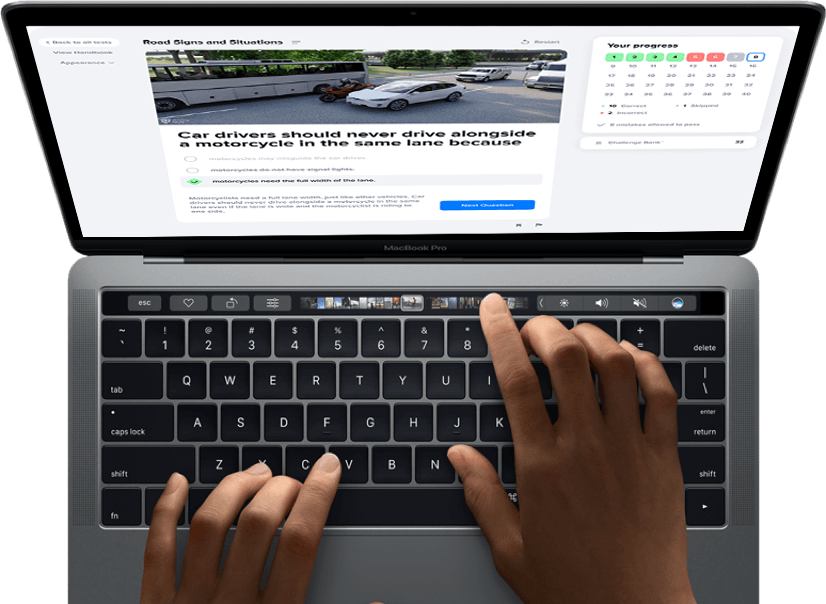
- Entertainment en Route: Drivers vs. Others
- Commuter Contentment
- Fast Commute, Fulfilling Career?
- Working on the Way
- Commute Time Comparisons
- Multitasking or Relaxing: Your Commute Call
Americans’ commutes are extending: According to the U.S. Census Bureau, it now takes the average professional roughly 27 minutes to get to work each morning. Commuting conditions are particularly brutal in dense metropolitan areas, with a striking percentage of workers traveling 90 minutes or more in each direction. To avoid rush-hour traffic, professionals are increasingly using public transportation or choosing to work from home.
But what if your daily commutes could be more than an obnoxious obligation? Some commuters view their travel time as an opportunity for productivity, communicating with colleagues, or planning the day to come. Others indulge in entertainment, whether it is reading a book on the subway or binging a podcast behind the wheel.
We asked 997 commuters what they did while traveling to work and back, studying how their commute activities corresponded to their professional satisfaction. Our findings reveal the impact of weekday travel and suggest which pastimes might make it more bearable. Could your commute be more constructive or enjoyable? Take a look at our results and see for yourself.
Entertainment en Route: Drivers vs. Others
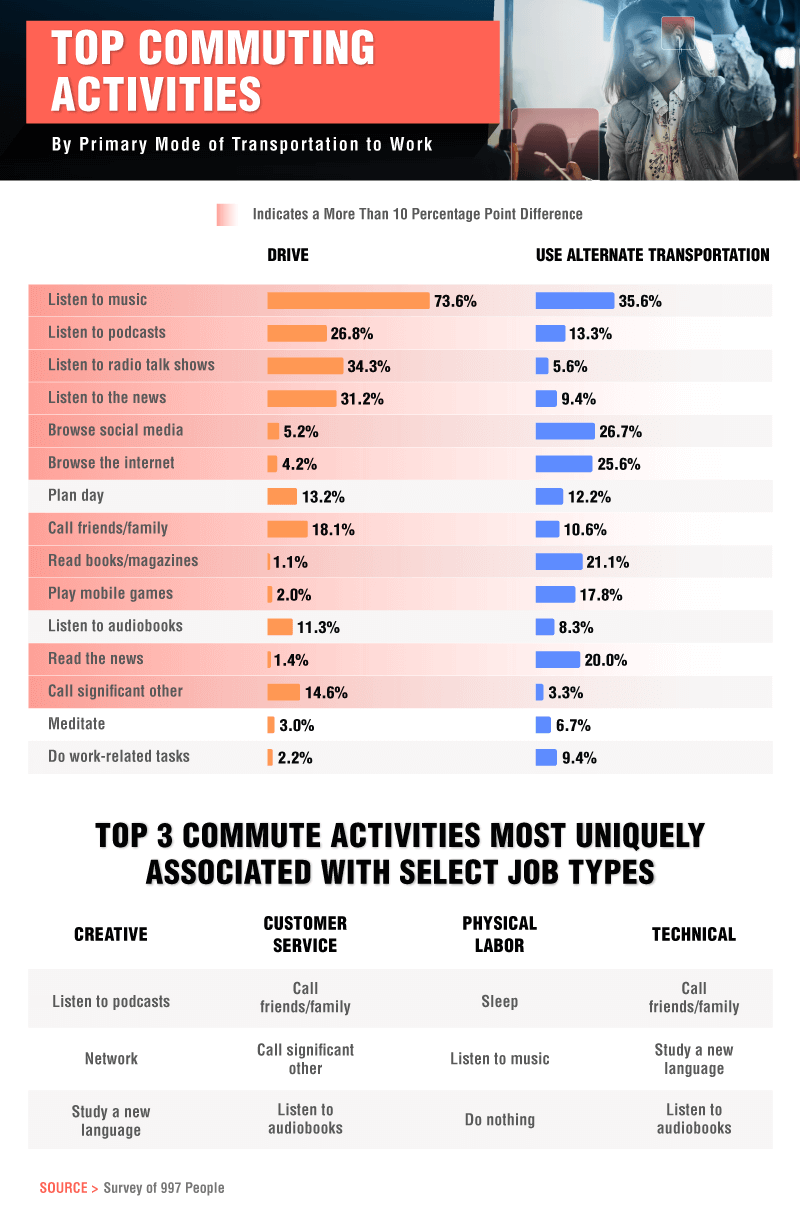
For those who commute by car, audio entertainment is essential. About three-quarters of drivers listened to music on their daily journeys, while roughly a third listened to radio talk shows or the news. Despite their remarkable rise in recent years, podcasts were somewhat less popular with drivers -- although they were a particular hit with those holding creative jobs.
Phone calls were another common way to pass the time behind the wheel: 18% of drivers called family or friends, while roughly 15% rang their significant others. Interestingly, those in customer service positions were especially likely to make phone calls on their commutes, despite the distinct possibility of spending hours on the phone for work as well.
Nondriving commuters often used their smartphones while traveling, with over a quarter browsing the internet and social media. With Wi-Fi and wireless service available on many of the nation’s largest public transportation networks, this scrolling is now possible even underground.
Alarmingly, however, a significant portion of driving commuters also admitted to browsing behind the wheel. Two percent of drivers even admitted to playing games on their phones while commuting. As countless studies attest, these distractions substantially increase drivers’ odds of accidents and injuries.
Commuter Contentment
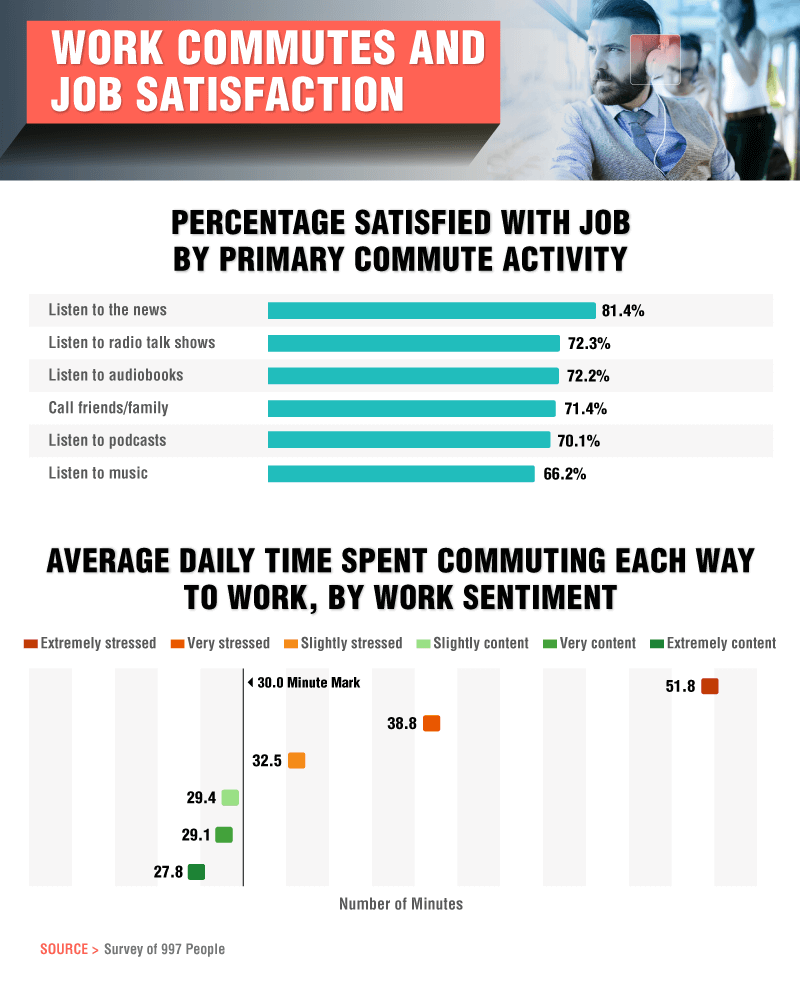
Do commuters who engage in certain activities have better experiences once they arrive at work? While correlation is not causation, certain pastimes were associated with high rates of professional satisfaction. Of those who listened to the news on their way to work, for example, over 81% were satisfied with their jobs. However, like most things, prework news consumption should be done in moderation. Starting the workday with excessive news stories on the brain may have the opposite effect.
More generally, several listening activities were associated with high rates of employee satisfaction. Of those who listened to podcasts, audiobooks, and radio talk shows, at least 70% were satisfied with their current employment. Conversely, perhaps visual commuting activities are less conducive to contentment. Scrolling through social media, for example, may make us envious of others and less appreciative of our personal and professional circumstances.
No matter how you spend your commute, a long journey in each direction can wear you down over time. Our findings showed a clear correlation between longer commutes and negative work sentiment. Among those who said they were “extremely stressed” about work, the average one-way trip to the office took over 50 minutes. Work frustration and tough commutes can be mutually reinforcing, and this dynamic can have serious health implications. Intense commuting has been linked to heart disease, exhaustion, and mental health challenges.
Fast Commute, Fulfilling Career?
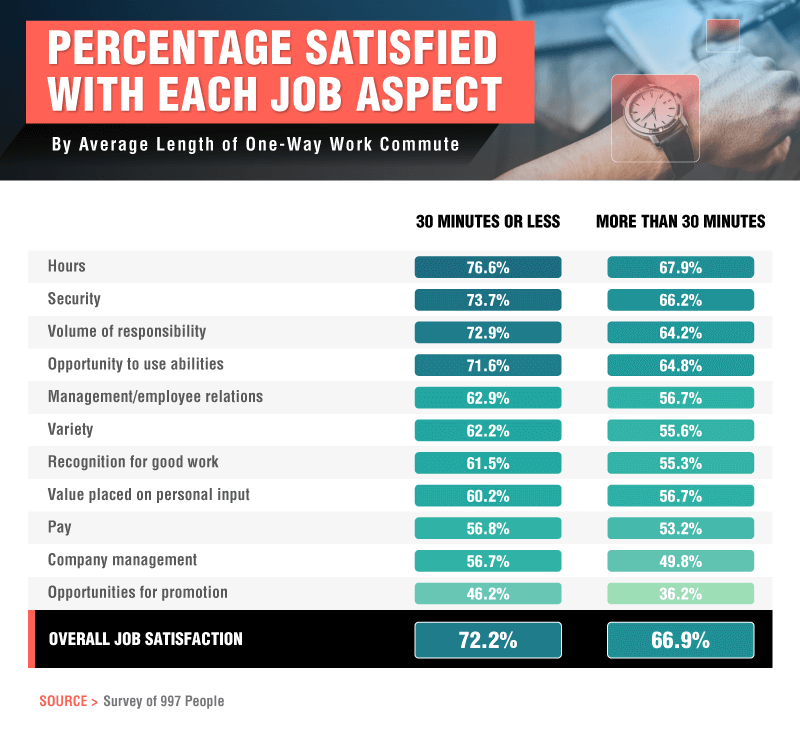
Could reducing your commute improve your professional experience? Across many aspects of their work lives, respondents with relatively short commutes were more likely to express satisfaction than their long-commuting counterparts.
This proved true in some predictable ways: Professionals with shorter commutes were more likely to be happy with their work hours because no one wants to follow a long day with a long drive. But more surprising results emerged as well, calling commuters’ reasoning into question.
For example, short commuters were substantially more likely to be satisfied with their chances of getting a promotion. Would you accept a long commute for a job with little room for growth? Similarly, those with commutes longer than 30 minutes were less likely to appreciate the way their company was managed.
These findings suggest that long commuters may be motivated by a lack of employment alternatives, rather than enthusiasm for their current positions. Given America’s historically tight labor market, however, these discontent commuters might have better prospects than they imagine.
Overall, 72% of respondents with short commutes said they were satisfied with their jobs, whereas just 67% of long commuters said the same. These figures may explain why many employers are coming to the aid of their workers, offering incentives such as free public transportation to ease the commuting pain.
Working on the Way
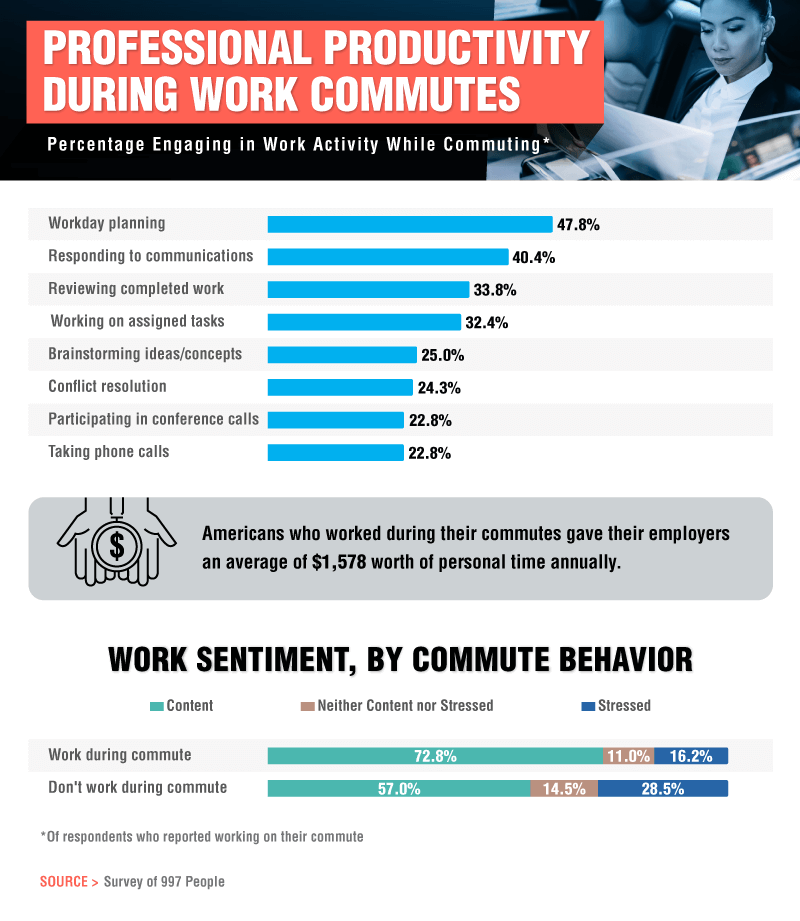
For some professionals, daily commutes are little more than an extension of the workday. With an ever-increasing set of digital tools at their disposal, many workers use their travel time for continued productivity. Among this group of respondents, the top commuting tasks were responding to work communications and planning the day. A slightly smaller portion made work-related phone calls during their daily trips.
To many, this trend of commute working may seem like another encroachment on personal time. If you’re always connected to work via your cellphone, are you ever truly off the clock? Indeed, according to our calculations, individuals who worked on their commute gave their employers an average of over $1,500 worth of personal time annually.
Interestingly, however, employees who worked on their commutes reported higher levels of contentment in relation to their jobs. This surprising finding could have multiple explanations. Maybe people who love their work are naturally inclined to spend more time on related tasks. Alternately, perhaps working while commuting helps reduce the stress associated with a long work to-do list: The extra time devoted could help make the day ahead feel more manageable.
Commute Time Comparisons
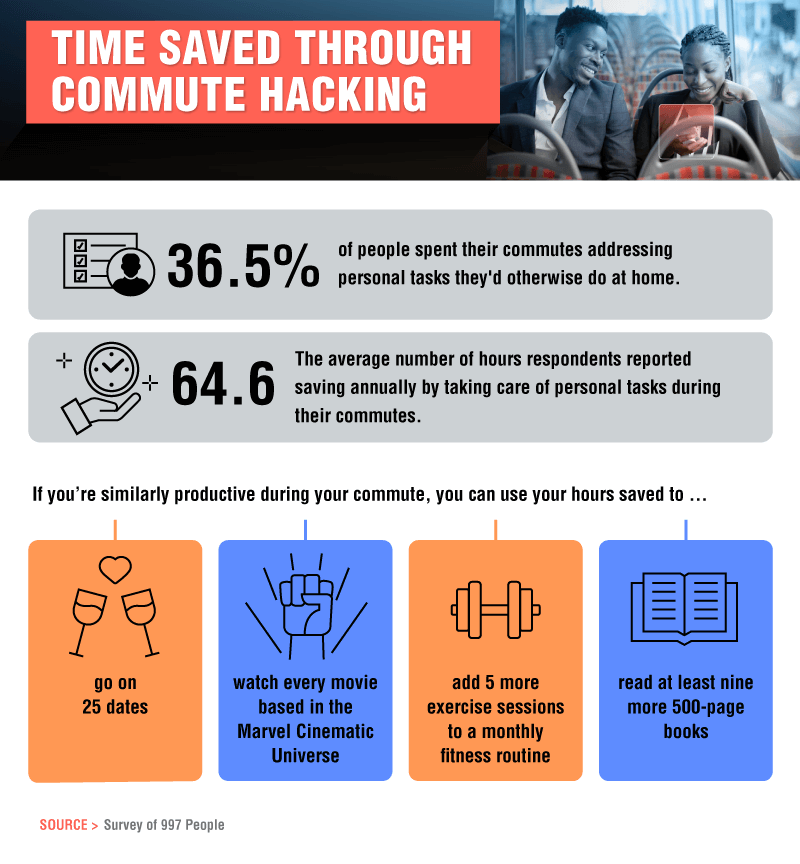
Commute times can also be used to accomplish personal tasks, although just over 3 in 10 respondents said they did so. However, these commute multitaskers saved a substantial amount of time annually: Nearly three days in total each year.
This timesaving approach could make other valuable pursuits possible, such as getting in five more workouts per month. If you’re one of the many Americans who say finding time is a major fitness barrier, this strategy could produce big health dividends.
Likewise, the extra time from commute multitasking could expand your reading schedule. Recent data suggests that audiobooks are becoming more popular among time-crunched Americans, but 64.6 additional hours would allow you to enjoy books in their traditional format as well.
Even your romantic life could benefit from the extra time you would get from completing personal tasks during your commute. You could go on 25 dates -- or get in more quality time with your current significant other.
Multitasking or Relaxing: Your Commute Call
Our findings indicate that long commutes can take their toll, elevating employee stress and exacerbating other frustrations. But this project also presents commuters with a reason for hope, no matter how far they may live from the office.
For some, our results might suggest incorporating one’s commute into the workday, using time in transit to check off tasks that might accumulate otherwise. Other professionals may address personal tasks, taking care of obligations that consume their time at home. If you’d rather stick with your podcasts, however, more power to you: Self-care is a worthy priority, and your commute is an opportunity to do whatever feels best.
If you’re new to driving, though, focus on safety first. Before you can begin the commuter grind, you’ll need to get your license. Thankfully, our free practice tests simulate the DMV’s test in your state. We make it easy -- and even enjoyable -- to study, pass, and get your permit. Check out driving-tests.org to see how we can help make your DMV test a success.
Methodology
We collected responses from 997 full-time employees who reported that they commuted to work for five or more days and worked at least 40 hours a week. All respondents had a minimum commute time of 15 minutes. Of our respondents, 51.3% were women, and 48.6% were men. The remaining 1% of respondents reported as nonbinary. Forty percent of respondents identified as millennials, 40% identified as belonging to Generation X, and 20% identified as baby boomers.
Depicted time equivalents were based on the ideal length of a date according to a survey conducted by Match.com, the combined length of released films in the Marvel Cinematic Universe, the assumption of one-hour exercise sessions, and the average adult’s reading speed of 300 wpm as reported by Forbes.
Survey responses were self-reported and therefore limited by self-reporting biases.
Fair Use Statement
We hope this project helps you commiserate with other commuters -- and find more fulfilling ways to enjoy your daily journey. In that spirit, we welcome you to share the images and information in this project for any noncommercial purpose. When you do share our work, we ask that you attribute us accordingly. The simplest way to do so is to include a link back to this page whenever you share this project.

